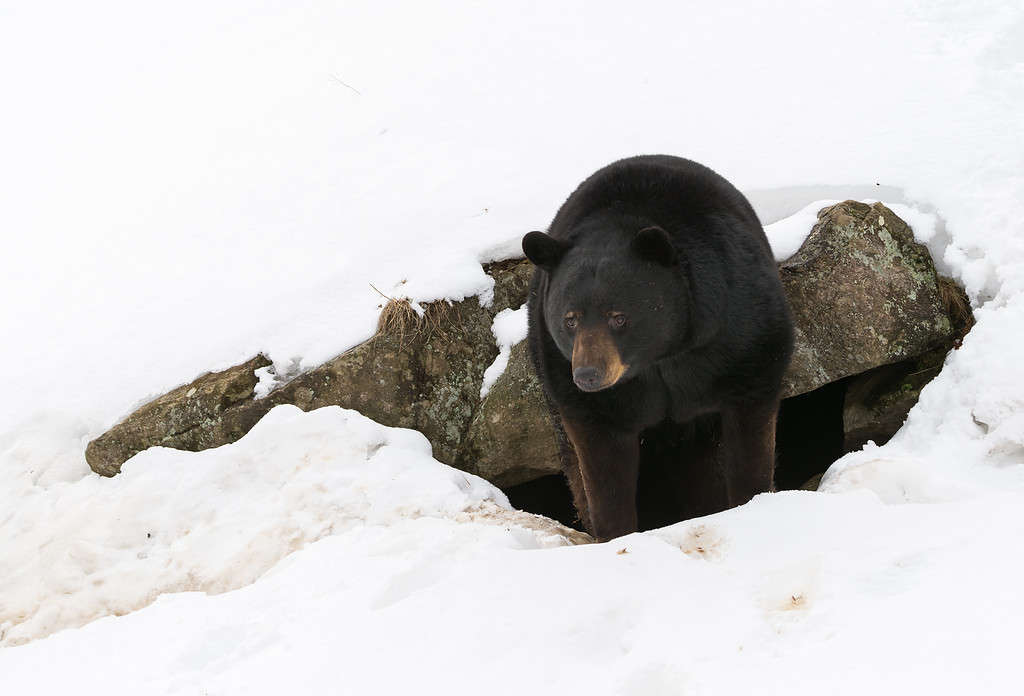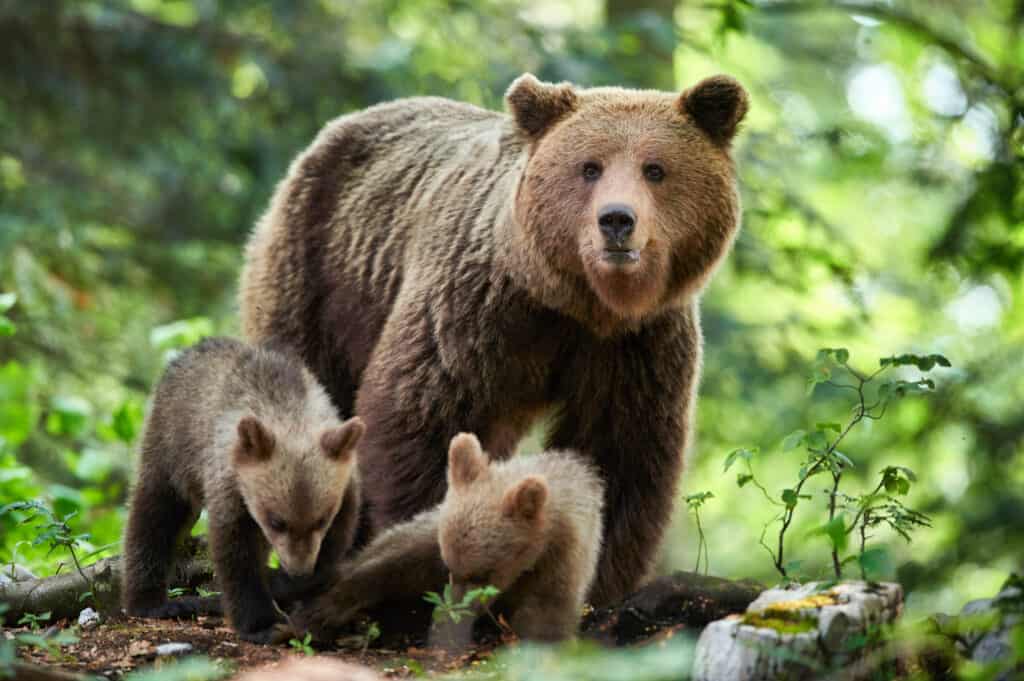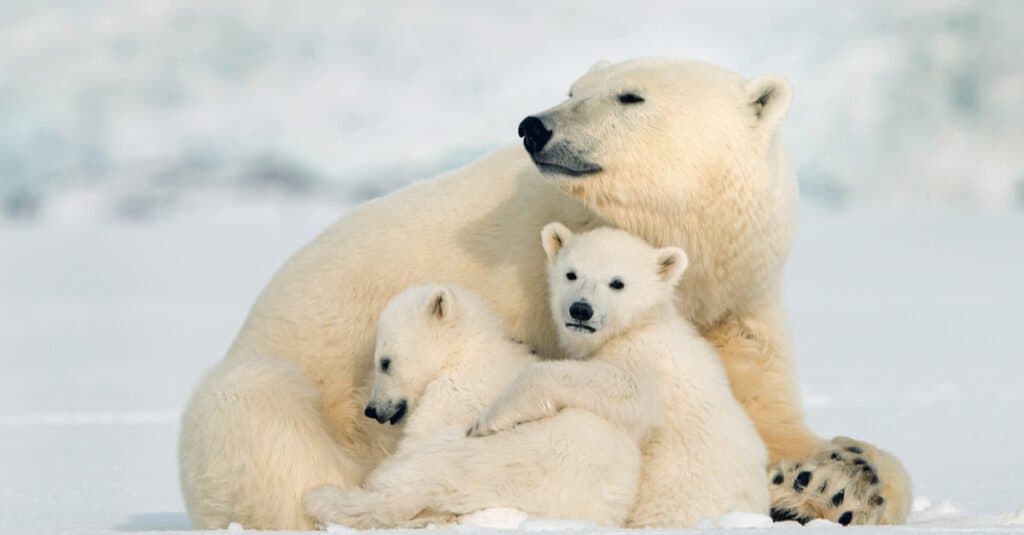Not all bears hibernate. Those that do typically hibernate for about 5 to 8 months through the winter, usually from about October or November through late March or April. Some bears in warmer coastal regions only hibernate for about 2 to 5 months. When bears hibernate, or enter a state of torpor, depends on their location, food availability, and the regional temperatures. In some species, only pregnant female bears hibernate through the winter, giving birth in their dens.
Hibernation in Bears Differs from Small Mammals
What is hibernation? Do just a little research on hibernation in bears and you will find much disagreement, even among scientists. Truly, bears do not enter the kind of deep hibernation that small mammals utilize to survive cold winters. Animals like ground squirrels can lower their body temperature below freezing and reduce their metabolism to a tiny fraction of normal for months on end. Bears must maintain a relatively warm body temperature. In many cases, a hibernating mother bear’s newborn cubs depend on her warmth for survival.
When Bears Hibernate, Their Metabolism Changes

Bears may wake up, move about, and even leave their dens for short periods during hibernation.
©Suzan Johnson/iStock via Getty Images
When bears hibernate, they sleep for long periods, barely moving about. Their heartbeat slows and their metabolism reduces by around half during hibernation. They live off enormous fat and protein stores that they build up in the late summer. Bears may sometimes wake up and even leave their dens for short periods in the winter. However, bears spend most of their time during hibernation lying in a small space in virtually the same position.
Bears Recycle Their Waste During Hibernation

Bears lose much of their body fat during hibernation, but they maintain muscle and bone mass.
©Piotr Krzeslak/Shutterstock.com
Bears do not urinate or defecate during hibernation. Instead, their bodies can recycle waste, turning nitrogen-rich urea back into proteins to prevent much muscle loss over the winter. They can also direct calcium and phosphorus back to their bones. Although bears lose around 30 percent of their body weight over the hibernation period, they emerge with little to no muscle loss and their bone mass intact. Most non-hibernating mammals would suffer terribly from bone loss and muscle atrophy in a fraction of the time that bears hibernate each year.
Bears Can Wake Quickly from Hibernation
Because bears do not enter the deep hibernation typical of small mammals, they wake much more easily. When a hibernating bear senses danger, it can rouse instantly and defend itself and any cubs that may be present. If you ever happen upon a hibernating bear’s den, move away quickly and quietly. Do not get tempted to peek inside.
Female Bears Are More Likely to Hibernate Than Males

Female polar bears often give birth to twin cubs in the middle of their hibernation period.
©isabel kendzior/Shutterstock.com
In some species, such as polar bears, only pregnant females hibernate. Male polar bears and non-pregnant females have no reason to hibernate. This species has adapted well to the extreme cold of their natural habitat, as have their primary food sources. The animals that polar bears eat maintain their presence throughout the winter, so bears that do not need to pause to give birth and raise cubs just keep on hunting and eating. Male American black bears also sometimes stay active through the winter, especially if they live where food remains plentiful all year.
Bear Cubs Born During Hibernation Are Tiny and Helpless
Bears are huge animals, with polar bears weighing up to 2,000 pounds, grizzly bears sometimes topping 1,600 pounds, and the largest known American black bear reaching approximately 1,100 pounds. But their newborn cubs can fit in the palm of your hand. Baby bear cubs born during their mother’s hibernation emerge hairless and blind. Polar bear cubs weigh 1.5 pounds or less at birth, while grizzly bear cubs average about 1 pound, and American black bear cubs weigh just 0.5 pounds. Giving birth to such tiny babies provides an advantage to hibernating mother bears. It takes less energy and resources for them to make nutrient-rich milk than to keep nourishing their fetal cubs in the womb. Cubs grow quickly on their mother’s milk and come out of the den in the spring ready to take on adventures.
Not All Bear Species Hibernate
Female polar bears hibernate. American black bears, Asiatic black bears, and many brown bears, including the grizzly bear native to North America, hibernate through the winter in areas where food is scarce and the weather is cold. Bears of these species that live in areas with plenty of available food may not hibernate. The non-hibernating bear species include giant pandas, sloth bears, sun bears, and spectacled bears. These bears live in warmer climates and have access to ample food sources all year round.
The photo featured at the top of this post is © Suzan Johnson/iStock via Getty Images
Thank you for reading! Have some feedback for us? Contact the AZ Animals editorial team.







